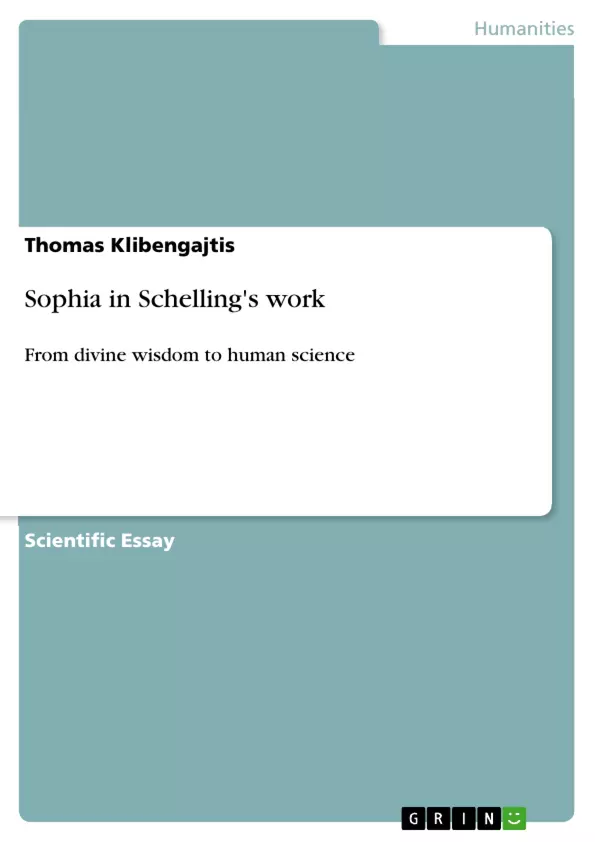This paper, presented on a conference on sophiology, presents Schelling's views on wisdom in terms of a holistic approach towards philosophy,science and life. It starts with Descartes, Kant and Fichte as introductory path to Schelling’s conception of the Absolute, continues with Schelling's own conception of the Absolute, presents Wisdom as the first potency of the Absolute and the World Soul. The paper concludes with the differentiation between wisdom and cleverness and shows Schelling's views on wisdom in knowledge, science and academics.
Inhaltsverzeichnis (Table of Contents)
- Descartes' I as the lynchpin of modern philosophy
- Kantian division of reality
- Fichte's way from the individual I to the Absolute I
Zielsetzung und Themenschwerpunkte (Objectives and Key Themes)
This text aims to analyze the concept of Sophia (wisdom) within the philosophical framework of F.W.J. Schelling. It delves into Schelling's conception of the Absolute, exploring his theories of potencies and Wissen (knowledge) as essential components of his understanding of wisdom.
- Schelling's conception of the Absolute
- The role of wisdom in Schelling's philosophy
- The influence of Descartes, Kant, and Fichte on Schelling's thought
- The relationship between the individual I and the Absolute I
- The concept of potencies in Schelling's work
Zusammenfassung der Kapitel (Chapter Summaries)
- Descartes' I as the lynchpin of modern philosophy: This section examines Descartes' groundbreaking concept of the I as the foundation of reality and thought, emphasizing the shift towards subjective idealism in philosophy. It explores Descartes' method of doubt, his proof for God's existence, and the implications of his understanding of substance for the relationship between the subject and the external world.
- Kantian division of reality: This chapter delves into Kant's transcendental philosophy, outlining his critique of the Cartesian viewpoint and his emphasis on reason as the primary source of knowledge. It examines Kant's distinction between representations and things in themselves, highlighting the active role of the subject in constructing reality.
- Fichte's way from the individual I to the Absolute I: This section explores Fichte's Wissenschaftslehre (science of knowledge), presenting his argument for the I as the sole source of reality and its role in shaping both the form and content of experience. It analyzes Fichte's concept of the non-I and his development of the Absolute I, demonstrating the movement from individual subjectivity to a more comprehensive understanding of the Absolute.
Schlüsselwörter (Keywords)
This text focuses on key concepts such as the Absolute, Sophia (wisdom), potencies, knowledge (Wissen), subject, individual I, Absolute I, Descartes, Kant, Fichte, and subjective idealism. It delves into the intellectual framework of German Idealism and explores Schelling's unique contribution to this philosophical tradition.
Frequently Asked Questions
What is Schelling's concept of Sophia (Wisdom)?
In Schelling's work, Wisdom is presented as the first potency of the Absolute and is closely linked to the "World Soul" and a holistic approach to science and life.
How did Descartes influence Schelling's thought?
Descartes' "I" (Cogito) serves as the lynchpin of modern philosophy. Schelling builds upon and critiques this foundation to develop his own conception of the Absolute.
What is the role of Fichte's "Absolute I" in this context?
The text explores Fichte's path from the individual "I" to the "Absolute I," which was a crucial stepping stone for Schelling's development of German Idealism.
How does Schelling distinguish between wisdom and cleverness?
The paper concludes by differentiating true wisdom (Sophia) from mere cleverness, applying this distinction to knowledge, science, and academic practice.
What are "potencies" in Schelling's framework?
Potencies are essential components or powers within the Absolute. Wisdom is identified as the primary potency that shapes our understanding of reality.
How does Kant's division of reality relate to Schelling?
Schelling's work addresses the Kantian division between representations and "things in themselves," seeking a more unified, holistic understanding of the Absolute.
- Arbeit zitieren
- Dr. phil. Mag. theol. Thomas Klibengajtis (Autor:in), 2009, Sophia in Schelling's work, München, GRIN Verlag, https://www.grin.com/document/191380



